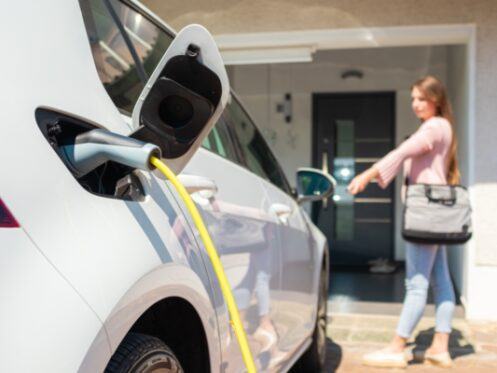These days, there are plenty of reasons to consider switching to an electric vehicle (or EV). Not only do they have the potential to help us protect the planet—they can also protect your wallet in the long term, too. But one thing that sometimes gives people pause is the idea that they have to go looking for an electric car charger anytime they want to take a drive. After all, public car battery chargers are still a lot less common than gas pumps.
So the question becomes, is charging your battery something you can do from home? The answer is yes—especially when you have the expert advice and skilled installation of a trusted electrician on your side. Installing an EV charging station in your home is easier than you might think once you know what to look for.
That’s why the electricians at Bacon Plumbing Heating Air Electric are here with this beginner’s guide to get you up to speed.
How to Charge a Car Battery with Home Electricity
Most EV drivers prefer to charge their cars at home. A J.D. Power study found that people who use permanent home charging stations are the most satisfied with their switch to electric. That said, you have 3 main options when it comes to charging at home.
Level 1 EV Chargers
Your vehicle should have come equipped with a level 1 charger. This cable provides you with a baseline of convenience right from the get-go. Level 1 chargers plug right into your standard wall outlet, giving you peace of mind wherever you are.
That said, because these chargers only have a 120-volt plug, they’re typically slow, taking upwards of 24 hours to provide a full charge. That’s why most drivers treat these as roadside backup or emergency options.
Portable Level 2 Chargers
Level 2 charging cables are much higher powered at 240 volts, providing faster speeds that you can get more mileage out of. These chargers will require specialized power outlets to handle the extra voltage, the same way your oven or washer and dryer do.
If you go this route, you’ll need to hire an electrician to make sure that your garage or driveway’s outlets and wiring can handle it. But since you’re going to be calling an electrician in the first place, you might want to go ahead and consider the more permanent option.
Permanent Level 2 Home Charging Stations
Having a standalone fast charging station installed in your garage or outdoor area provides a number of conveniences. First of all, you can get a full charge in about 4 to 5 hours, making it easy to plug your car in as you sleep with no fuss. In fact, the Texas Department of Transportation recommends charging between 10pm and 6am. This way, you can take full advantage of the power grid’s wind power peak capacity.
To make it even easier, you can plug the car in when you get home but set a timer for when you actually want it to start charging, so you don’t even have to think about it. All electric vehicles come equipped with these types of timers.
Because these stations use special outlets or, in some cases, are wired directly into your electrical panel, you can get up to 30 more miles for each hour of charging than you would with the factory-standard level 1 charger. And your electrician can help you set up the station wherever it will be most convenient for you.
Can At-Home Stations Help You Start a Dead Car Battery?
Like gasoline-fueled cars, EVs have batteries that can become depleted over time and need a little jump. They actually have two battery systems: the high-voltage battery pack that runs the car, and a 12-volt battery that operates things like your lights and power locks and helps get the car started. An at-home EV charging station can help you avoid ever depleting this smaller battery, as you can “set it and forget it” easily each night.
If for some reason your EV does lose charge to its 12 volt battery, you can try using a portable jumpstart device that connects to the battery terminal. A gas-powered car also has the necessary positive and negative terminals to help you get going, but never use another EV to jumpstart the battery.
Once you’re set, call an electrician to inspect your charging station to make sure that everything is in proper working order.
Does Texas Have any EV Incentives?
The State of Texas has an active rebate program for residents who buy electric cars. Texas is offering a $2,500 rebate in addition to the US Federal tax credit of up to $7,500. Some local utility providers like Oncor also offer rebates for installing charging stations at home, making the choice to upgrade a pretty easy one to make.
How Do I Choose the Right EV Charging Station for My Home?
Start by taking account of how many EVs you’ll need to charge, how often you’ll use them, and your average mileage. Then call an expert to help you size and decide! Today’s chargers have a wide range of options and features, from smart efficiency tracking to WiFi connectivity and beyond. Whatever your needs, there’s an option out there to suit them perfectly.
The licensed and trained electricians at Bacon are continuously staying abreast of the latest EV chargers on the market. They’ll know how to help you decide on the perfect system to meet the needs of your car, match your home’s energy capabilities, and provide the features and functions you care about most!
Expert Electric Car Charger Installation in Dallas-Fort Worth, TX
Whether you’ve already purchased a new EV or are planning ahead to make the switch, call the electricians at Bacon Plumbing Heating Air Electric to help make the transition as smooth as possible. We’ll handle the complexities so you can focus on enjoying your new ride in style. Call us today at (469) 213-6505 or schedule an appointment online.




